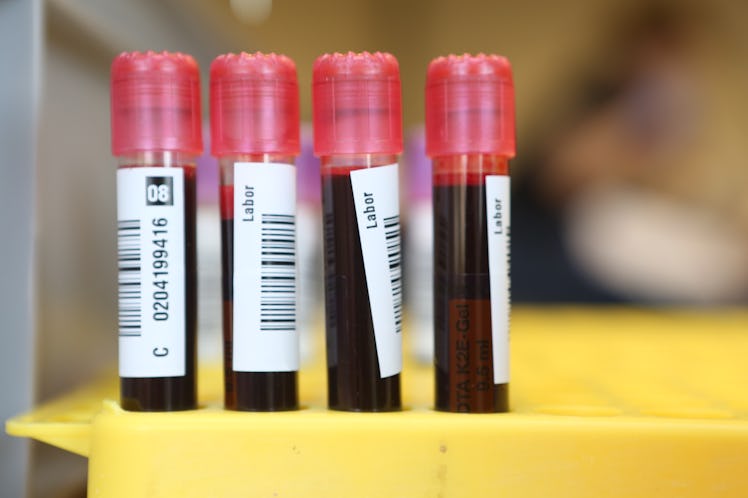
You Can Help Others During The Coronavirus Pandemic By Donating Blood
As of April 2, the United States has over 230,000 known cases of the novel coronavirus, which causes the respiratory illness COVID-19, and states and cities have increasingly imposed restrictions on their residents' movements. Across the country, officials are encouraging people to stay at home unless they are essential workers — like health care professionals or grocery store employees — and to avoid any unnecessary outings. But as people practice these more aggressive social distancing measures, hospitals have had to contend with plummeting blood donations. Here's how to donate blood during the coronavirus pandemic, because yes, it is still safe to do so.
According to NPR, as of March 23, fewer people were donating blood because they have largely stayed at home, and schools and offices that typically host blood drives were shut down due to the pandemic. The American Red Cross experienced a significant blood shortage as a result, ABC 7 News reported, because people were worried about safety. In a statement issued on March 21, the Red Cross noted that it had received 200,000 fewer donations than normal due to blood drive cancellations across the country. To combat fears of coronavirus infection, the Red Cross has reportedly taken extra steps to sanitize surfaces and ensure social distancing in its facilities. Blood donors and staff members alike have to get their temperature taken every time they enter a Red Cross facility, too, to make sure they are healthy.
A March 19 statement from the U.S. Food & Drug Administration (FDA) indicated that it is still safe to give blood — and necessary, too, because there are still patients across the country with health conditions other than coronavirus who require blood transfusions. If you are healthy and would like to donate blood, there are steps you can take to do so in a safe way. First, you can find a blood bank near you by searching the American Association of Blood Banks locator, or by visiting the Red Cross blood donation website website. Then, get in touch with your local blood bank to see what their procedure is for donating blood, and to make an appointment. The Red Cross lets you make appointments through their Blood Donor App, or you may be able to schedule through local blood banks' websites or call them directly.
As was the case before the pandemic, there are a few restrictions on who can donate blood. You should weigh at least 110 pounds, and you have to be at least 17 years old — though in some states, you might be able to donate blood at age 16 with parental consent. You can also only donate every 56 days, for your own safety, per the Red Cross. A controversial restriction has also long prohibited any man who has had sex with other men within the last 12 months from donating blood. In light of the ongoing blood shortage due to the coronavirus pandemic, on April 2, the Food and Drug Administration (FDA) changed the recommended deferral period for men who have sex with men from 12 months to three months.
Even as they continue to accept blood donations for a wide variety of procedures, health care practitioners across the country may soon start using "convalescent plasma" from recovered coronavirus patients to treat those who are still infected, The New York Times reported. Plasma from recovered patients contains antibodies to the novel coronavirus, and a transfusion of plasma containing these antibodies may help seriously ill patients fight off the disease. According to NBC News, plasma therapy was used to treat patients during recent epidemics like ebola, SARS, and H1N1 influenza, but this treatment is still experimental in the case of the ongoing coronavirus pandemic. On March 24, the FDA gave permission for hospitals to use plasma on an emergency basis as a form of treatment, and many hospitals in hotspots like New York City have already asked to participate.
Following emergency calls for blood donations, blood banks and the Red Cross saw an uptick in individual donors, The Washington Post reported on March 31, but health care professionals are still concerned that the United States could soon experience a blood shortage. Even if doctors have access to enough blood donations now, the Post reported, blood cells have an expiration date, and an adequate supply at the beginning of April does not guarantee an adequate supply at the beginning of May. That's why experts are encouraging Americans who are healthy and able to continue donating blood. The coronavirus isn't believed to be blood-borne, and officials are taking every precaution to make sure that donating blood is safe.
If you think you’re showing symptoms of coronavirus, which include fever, shortness of breath, and cough, call your doctor before going to get tested. If you’re anxious about the virus’s spread in your community, visit the CDC for up-to-date information and resources, or seek out mental health support. You can find all Elite Daily's coverage of coronavirus here.